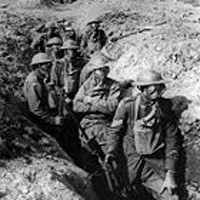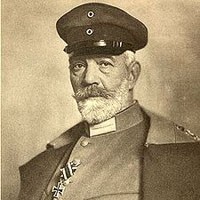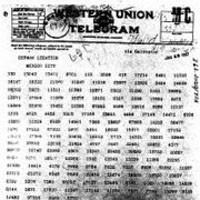The US involvement in World War I stemmed from Germany’s resumption of unrestricted submarine warfare and attempts to form an alliance with Mexico. At WHY.EDU.VN, we delve into the multifaceted reasons behind this pivotal decision, offering comprehensive insights and clarifying historical complexities. Explore the factors that propelled America into the Great War, including economic interests, moral obligations, and security concerns, all explained with clarity and precision.
1. Unrestricted Submarine Warfare and the Sussex Pledge
Germany’s decision to resume unrestricted submarine warfare in 1917 was a primary catalyst for the United States entering World War I. This policy entailed attacking all ships, including passenger and merchant vessels, in designated war zones around Great Britain and France.
1.1 The Sussex Incident
In March 1916, a German U-boat torpedoed the French passenger ship Sussex in the English Channel. Although the ship did not sink, about 80 people, including several Americans, were killed or injured.
Following the Sussex incident, President Woodrow Wilson threatened to sever diplomatic relations with Germany unless they ceased attacking passenger ships and allowed crews of merchant vessels to abandon ship before any attack.
1.2 The Sussex Pledge
On May 4, 1916, the German government agreed to Wilson’s demands, issuing what became known as the “Sussex pledge.” Germany promised not to sink passenger ships without warning and to provide for the safety of passengers and crew.
1.3 Resumption of Unrestricted Submarine Warfare
By January 1917, facing a stalemate on the Western Front and increasing domestic pressure, Germany’s military leadership, including the Navy, convinced Kaiser Wilhelm II that unrestricted submarine warfare could force Great Britain to capitulate within five months.
German policymakers believed that the United States was no longer a neutral party, as it supplied munitions and financial assistance to the Allied powers. They also felt that the United States had compromised its neutrality by acquiescing to the Allied blockade of Germany.
Chancellor Theobald von Bethmann-Hollweg opposed this decision, warning that it would inevitably draw the United States into the war, leading to Germany’s defeat. However, his warnings were ignored.
On January 31, 1917, German Ambassador to the United States Count Johann von Bernstorff informed U.S. Secretary of State Robert Lansing that Germany would resume unrestricted submarine warfare the following day.
This action directly threatened American lives and commerce, making it increasingly difficult for the United States to remain neutral.
2. The Zimmermann Telegram: A Direct Threat
The Zimmermann Telegram was a secret diplomatic communication issued from the German Foreign Office in January 1917 that proposed a military alliance between Germany and Mexico if the United States entered World War I against Germany.
2.1 Interception and Decryption
On January 19, 1917, British naval intelligence intercepted and decrypted the telegram, which was sent by German Foreign Minister Arthur Zimmermann to the German Ambassador in Mexico City, Heinrich von Eckardt.
2.2 The Telegram’s Contents
The telegram instructed the ambassador to approach the Mexican government with a proposal: if the United States entered the war, Mexico should ally with Germany. In return, Germany promised to help Mexico recover the territory it had ceded to the United States following the Mexican-American War (1846-1848), specifically Texas, New Mexico, and Arizona.
The telegram also suggested that Mexico should encourage Japan to join the alliance against the United States.
2.3 British Disclosure to the United States
Initially, the British delayed sharing the telegram with the United States, fearing that the Germans would discover that their code had been broken. However, after Germany resumed unrestricted submarine warfare in February, the British decided to use the telegram to sway U.S. public opinion in favor of joining the war.
The British forwarded the intercepted telegram to President Wilson on February 24, 1917.
2.4 Impact on U.S. Public Opinion
The Zimmermann Telegram was published in the U.S. press on March 1, 1917, and it ignited public outrage. Americans saw the telegram as a blatant act of hostility and a direct threat to their national security.
The telegram significantly shifted public opinion in favor of war, as many Americans now believed that Germany posed an immediate and credible threat to the United States.
3. Economic Interests and Trade
The United States’ economic interests and trade relationships played a significant role in its decision to enter World War I.
3.1 Trade with the Allies
At the onset of World War I, the United States declared its neutrality, aiming to trade with all belligerent nations. However, this policy quickly became untenable due to the Allied naval blockade of Germany.
The Allied blockade severely restricted American trade with Germany, while trade with the Allied nations, particularly Great Britain and France, increased substantially.
American businesses and banks provided significant loans and credit to the Allies, further solidifying the economic ties between the United States and the Allied powers.
3.2 Economic Dependence on the Allies
By 1917, the American economy had become heavily dependent on trade with and loans to the Allies. A collapse of the Allied war effort would have had severe economic consequences for the United States, including potential financial ruin for American banks and businesses.
3.3 Protecting American Investments
The U.S. government recognized that its economic interests were closely aligned with the success of the Allied powers. To protect these investments, the United States needed to ensure that the Allies were victorious in the war.
This economic imperative contributed to President Wilson’s decision to ask Congress for a declaration of war against Germany.
4. Moral and Ideological Factors
Moral and ideological considerations also influenced the United States’ decision to enter World War I.
4.1 Wilson’s Idealism
President Woodrow Wilson was a staunch advocate of democracy and international law. He believed that the United States had a moral obligation to defend these principles against authoritarianism and aggression.
Wilson viewed World War I as a struggle between democracy and autocracy, and he believed that the United States could not stand idly by while democracy was threatened in Europe.
4.2 “Making the World Safe for Democracy”
In his war message to Congress on April 2, 1917, Wilson famously stated that the United States’ goal in entering the war was to “make the world safe for democracy.”
This idealistic vision resonated with many Americans, who believed that the United States had a duty to promote democracy and freedom around the world.
4.3 Outrage Over German Actions
The German invasion of Belgium in 1914, the use of unrestricted submarine warfare, and the Zimmermann Telegram all fueled moral outrage in the United States.
Many Americans viewed these actions as violations of international law and basic human decency, further strengthening the case for intervention.
5. The Sinking of U.S. Ships
The sinking of several U.S. ships by German submarines in early 1917 heightened tensions between the United States and Germany and contributed to the U.S. decision to enter World War I.
5.1 U.S. Neutrality and Freedom of the Seas
As a neutral nation, the United States asserted its right to trade with all belligerent nations and to sail freely on the high seas.
Germany’s policy of unrestricted submarine warfare violated this principle, as German U-boats attacked and sank U.S. merchant ships without warning.
5.2 Key Ships Sunk
Several U.S. ships were sunk by German submarines in February and March 1917, including the Housatonic, the Lyman M. Law, and the Vigilancia.
These attacks resulted in the deaths of numerous American seamen and citizens, further inflaming public opinion against Germany.
5.3 Escalating Tensions
The sinking of U.S. ships was a direct attack on American sovereignty and a violation of international law.
These incidents increased pressure on President Wilson to take action against Germany, ultimately leading to his decision to ask Congress for a declaration of war.
6. Failure of Diplomacy
Despite President Wilson’s best efforts, diplomatic efforts to resolve the conflict between the United States and Germany ultimately failed.
6.1 Wilson’s Mediation Efforts
Throughout the early years of World War I, President Wilson attempted to mediate a peaceful resolution to the conflict. He sent envoys to Europe to meet with leaders from both sides, but his efforts were unsuccessful.
6.2 Germany’s Unwillingness to Negotiate
Germany was unwilling to negotiate a settlement that would have preserved American neutrality and protected American interests.
The German government believed that it could win the war through unrestricted submarine warfare and was unwilling to compromise on this policy.
6.3 Breakdown of Relations
The resumption of unrestricted submarine warfare and the Zimmermann Telegram made it clear that Germany was not interested in a peaceful resolution to the conflict.
These actions led to a breakdown of diplomatic relations between the United States and Germany, leaving President Wilson with little choice but to ask Congress for a declaration of war.
7. Public Opinion and Propaganda
Public opinion and propaganda played a significant role in shaping the United States’ decision to enter World War I.
7.1 Shifting Public Sentiment
Initially, many Americans were opposed to intervention in the European conflict. However, as the war progressed and German actions became more egregious, public sentiment began to shift in favor of intervention.
7.2 The Role of Propaganda
Both the Allied and German governments engaged in extensive propaganda campaigns to influence American public opinion.
Allied propaganda emphasized German atrocities and portrayed the war as a struggle between democracy and autocracy.
German propaganda attempted to justify German actions and portray the Allies as imperialistic powers.
7.3 Impact on Intervention
Propaganda played a significant role in shaping public perceptions of the war and influencing the debate over intervention.
By highlighting German aggression and portraying the Allies as defenders of democracy, Allied propaganda helped to galvanize support for intervention in the United States.
8. The Russian Revolution
The Russian Revolution of 1917 had a significant impact on the United States’ decision to enter World War I.
8.1 Overthrow of the Tsarist Regime
In March 1917, the Tsarist regime in Russia was overthrown in the February Revolution. This event removed a major obstacle to U.S. entry into the war.
8.2 Moral Concerns
Prior to the revolution, many Americans were reluctant to ally with Tsarist Russia, which was viewed as an autocratic and repressive regime.
The overthrow of the Tsar removed these moral concerns, making it easier for the United States to join the Allied cause.
8.3 Impact on the War Effort
The Russian Revolution also had a significant impact on the Allied war effort. Russia’s withdrawal from the war in 1918 freed up German troops on the Eastern Front, allowing them to be redeployed to the Western Front.
This increased the pressure on the Allied forces and made it more urgent for the United States to intervene.
9. Strategic Considerations
Strategic considerations also played a role in the United States’ decision to enter World War I.
9.1 Maintaining the Balance of Power
The United States had a long-standing interest in maintaining the balance of power in Europe. A German victory in World War I would have upset this balance and potentially threatened American security.
9.2 Preventing German Domination
The U.S. government feared that a German victory would lead to German domination of Europe and potentially the world.
This concern motivated the United States to intervene in the war to prevent Germany from achieving its objectives.
9.3 Protecting American Interests
The United States also had strategic interests in protecting its trade routes and access to markets in Europe and around the world.
A German victory would have threatened these interests, prompting the United States to intervene to protect its economic and strategic position.
10. Congressional Approval and Declaration of War
On April 2, 1917, President Woodrow Wilson went before a joint session of Congress to request a declaration of war against Germany.
10.1 Wilson’s War Message
In his war message, Wilson cited Germany’s violation of its pledge to suspend unrestricted submarine warfare, as well as its attempts to entice Mexico into an alliance against the United States, as his reasons for declaring war.
Wilson argued that the United States had a moral obligation to defend democracy and international law against German aggression.
10.2 Congressional Debate
The request for a declaration of war sparked a heated debate in Congress. Some members opposed intervention, arguing that the United States should remain neutral in the European conflict.
However, a majority of members supported Wilson’s request, believing that the United States had no choice but to defend its interests and values.
10.3 Formal Declaration
On April 4, 1917, the U.S. Senate voted in support of the measure to declare war on Germany by a vote of 82 to 6. The House of Representatives concurred two days later by a vote of 373 to 50.
The United States later declared war on German ally Austria-Hungary on December 7, 1917.
The decision to enter World War I marked a turning point in American history, transforming the United States from a neutral power into a major player on the world stage.
Understanding the multifaceted reasons behind this decision is crucial for comprehending the trajectory of 20th-century global politics. For more in-depth analyses and expertly curated information, visit WHY.EDU.VN, your premier source for insightful educational content.
The reasons why the US got involved in World War 1 are complex. They include unrestricted submarine warfare, the Zimmermann Telegram, economic interests, moral and ideological factors, and the failure of diplomacy. All of these elements combined to drive the US to join the Allied forces.
Have more questions about why the US got involved in WW1? Or perhaps you are curious about other historical events or complex topics? Visit WHY.EDU.VN, where our team of experts is ready to provide clear, concise, and reliable answers to all your questions. Our platform is designed to make learning easy and accessible. Contact us at 101 Curiosity Lane, Answer Town, CA 90210, United States. Whatsapp: +1 (213) 555-0101. Website: why.edu.vn.
FAQ: The United States and World War I
Here are some frequently asked questions regarding the United States’ involvement in World War I:
| Question | Answer |
|---|---|
| What was the main reason the U.S. entered World War I? | The primary reason was Germany’s resumption of unrestricted submarine warfare, which threatened American lives and commerce. The Zimmermann Telegram, proposing an alliance between Germany and Mexico against the U.S., further incensed American public opinion. |
| When did the U.S. officially declare war on Germany? | The U.S. officially declared war on Germany on April 6, 1917. |
| What was the Zimmermann Telegram? | The Zimmermann Telegram was a secret diplomatic communication from Germany to Mexico, proposing a military alliance against the U.S. if the U.S. entered World War I. It promised Mexico the recovery of territory lost to the U.S. in the Mexican-American War. |
| How did economic factors influence the U.S. decision? | The U.S. had significant economic ties with the Allied powers, providing loans and supplies. A collapse of the Allied war effort would have had severe economic consequences for the U.S., prompting intervention to protect its investments. |
| What role did President Wilson play in the decision? | President Woodrow Wilson initially sought to maintain U.S. neutrality but was eventually convinced that intervention was necessary to “make the world safe for democracy” and protect American interests. |
| What was unrestricted submarine warfare? | Unrestricted submarine warfare was a German naval policy of attacking all ships, including passenger and merchant vessels, in designated war zones without warning. |
| How did the sinking of the Lusitania affect U.S. opinion? | The sinking of the Lusitania in 1915, which resulted in the deaths of many American citizens, contributed to growing anti-German sentiment in the U.S., although it did not immediately lead to a declaration of war. |
| What was the Sussex Pledge? | The Sussex Pledge was a promise made by Germany in 1916 to not sink passenger ships without warning, following the torpedoing of the French passenger ship Sussex. This pledge was later broken when Germany resumed unrestricted submarine warfare in 1917. |
| How did the Russian Revolution impact the U.S. decision? | The Russian Revolution of 1917, which overthrew the Tsarist regime, removed a moral obstacle for the U.S. to ally with the Allied powers. |
| What were the strategic considerations for the U.S.? | Strategic considerations included maintaining the balance of power in Europe, preventing German domination, and protecting American trade routes and access to markets. |




These FAQs provide a concise overview of the key factors and events that led to the United States’ involvement in World War I.

